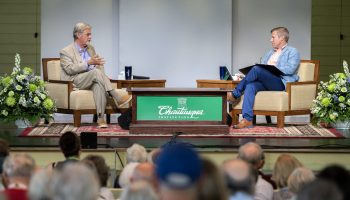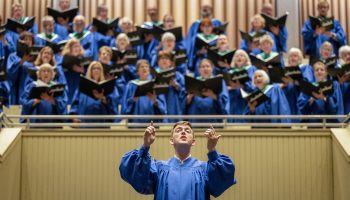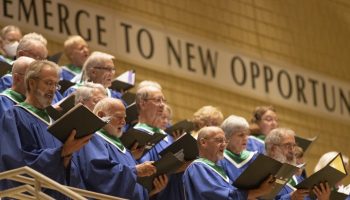Martin Luther not only transformed Christianity nearly 500 years ago, he also revolutionized the creation of hymns.
At 8 p.m. Sunday in the Amphitheater, the Sacred Song Service “Here I Stand” will kick off the week’s theme, “A Crisis of Faith?” with an ode to Luther’s musical work and his bold reimagining of faith. The Chautauqua Choir and Jared Jacobsen, organist and coordinator of worship and sacred music, will perform a set of hymns inspired or created by Luther to celebrate the 500th anniversary of the Protestant Reformation.
“I think we are closer to the spirit of the Protestant Reformation at Chautauqua than at most places, like in a denominational church, because we all do worship together,” Jacobsen said. “We intentionally invite groups within the Christian tent to be with us.”
The first Luther-inspired hymn the choir will perform Sunday is “Soli Deo Gloria” by Marty Haugen. While the phrase, which means “to God alone be the glory,” is famous for being Bach’s signature, Jacobsen said it is symbolic of Luther, who was someone who wanted to “get out of the way” of God. The phrase, Jacobsen said, gives all of the glory to God, rather than to a clergyman.
In the same thread, Luther valued hymns, like Chautauquans do, because he felt they made worship more accessible, Jacobsen said. Luther translated hymns from Latin to German so that people could understand them, and created more engaging hymns that would make people more enthusiastic about worship service.
The hymn “Savior of the Nations, Come” is representative of this approach. Luther translated the original text by an ancient Roman named Ambrose of Milan into layman’s German. Luckily for Chautauquans, there’s an English translation, which Jacobsen and the choir will perform on Sunday.
A Luther classic, “A Mighty Fortress Is Our God,” will be the final hymn of the evening. Jacobsen said while most modern iterations are regal and stately, Luther’s original was actually an upbeat tune that possibly originated as a drinking song. The choir will perform both versions during the service, and each gives off a different “magic” of its own, Jacobsen said.
Ultimately, Jacobsen said he wants to make the service inclusive because that’s what Luther would have wanted. It’s also what Chautauquans always do, Jacobsen said, by bringing Christian denominations of all kinds together in one place.
“I have a hunch he would have liked this place,” Jacobsen said.




